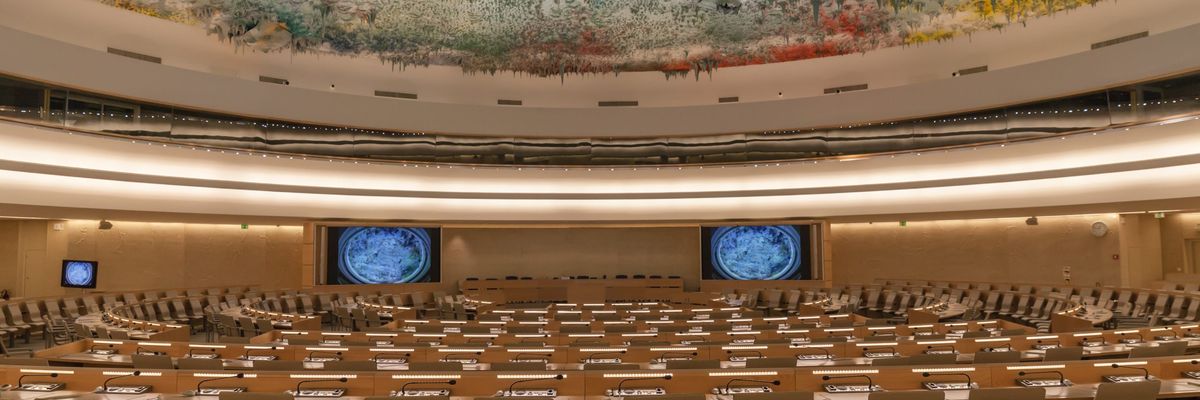In the two weeks since U.S. President Donald Trump unveiled his “Deal of the Century” for Israel and Palestine, an international tug-of-war has unfolded between two opposing visions. The first demands equal rights for Israelis and Palestinians, including in the form of a just two-state solution, based on international law. The second would formalize Palestinian subjugation under indefinite military rule by Israel, the sole sovereign between the Jordan River and the Mediterranean Sea.
This tug-of-war, which caused deep divisions during a special session of the UN Security Council in New York this week, has now moved to Geneva, after the UN Human Rights Council on Wednesday released a database of 112 businesses that are involved in Israeli settlements. Commissioned in March 2016, the report was repeatedly delayed due to concerted political pressure by Israel, the United States, and some European countries.
The report’s unveiling is itself an accomplishment, as it provides an important basis for promoting corporate accountability around the Israeli occupation. But real success — namely, whether it can effectively disincentivize business dealings with settlements — remains uncertain.
The vast majority of the listed companies (94) are Israeli, with others from Thailand, Luxembourg, the United Kingdom, France, the Netherlands, and the United States. They include service providers, banks, and foreign tour operators, all of which are integral to maintaining and expanding the settlements. These businesses further normalize the settlements as part of Israel, while erasing the state’s distinction from the territories that are the basis for Palestinian statehood.
Contrary to what its critics claim, the database is not an unprecedented step by the UN, nor even its strongest. In 2003, a commission established by the UN Security Council detailed the involvement of some 75 companies that were contributing to the conflict in the Democratic Republic of Congo by illegally exploiting the country’s natural resources. In August 2019, UN experts listed 59 foreign companies with financial ties to Myanmar’s military, and called for criminal investigations and sanctions against them.
By contrast, the scope of the database on Israeli settlement businesses appears rather conservative. Unlike the Myanmar report, it comes with no direct consequences beyond the potential for reputational damage. Moreover, the Office of the United Nations High Commissioner for Human Rights stuck very narrowly to the criteria laid out in its parent Human Rights Council resolution when deciding which companies to include.
As a result, there are some noticeable omissions from the UN report. Conspicuously absent are those involved in the illegal exploitation of Palestinian natural resources. For example, the activities of Heidelberg Cement, which operates plants and quarries in West Bank settlement zones, are well documented. Also absent is FIFA, whose Israeli subsidiary, the Israel Football Association (IFA), includes six settlement teams in contravention of FIFA’s own statutes.
Disinformation Campaign
The UN report, therefore, cannot simply be a one-off document. Regular updates would give listed companies the chance to dissociate themselves from their settlement-related activities in order to be removed from the database. Future editions must also widen their lists’ scope and proximity.
Still, much will come down to the hard political bargaining that will shape the decisions of the Human Rights Council members.
Palestinians have traditionally enjoyed a majority in this forum; but as the lead-up to this week’s Security Council meeting showed, the United States is prepared to use all the leverage at its disposal to shield Israel’s settlement project from international censure and to force other countries into line. Such tactics will undoubtedly be replicated during next month’s Human Rights Council session, where decisions about the database’s future could be taken.
Meanwhile, a campaign of disinformation and threats is already underway to discredit the initiative, waged by the U.S. and Israeli governments alongside a network of pro-settlement organizations. Many of these smears were similarly thrown at the EU after it issued guidelines on the labeling of Israeli settlement products.
Besides accusing the EU of perpetrating an “economic terror attack,” defenders of the settler movement are even exploiting Holocaust imagery for their political gain. By equating the most minimal measures against illegal Israeli settlements to the darkest moments in Jewish and European history, these attacks are attempting to bully and browbeat any country that stands up for the most fundamental norms of international law and human rights.
European states like the UK, Germany, and the Netherlands have at times joined these Israeli and American efforts to obstruct the database, putting them at odds with their long-held positions opposing Israeli settlement activities, in line with UN Security Council resolution 2334.
At a moment in which the United States and Israel are ripping up the basis for a meaningful two-state solution, members of the international community, particularly European states, should take a moment to reflect on where they stand.
Rather than join the battle against accountability mechanisms, governments should treat the UN database as a tangible effort to preserve the territorial footprint of a future Palestinian state. They should also see it as an opportunity to strengthen domestic, mandatory due diligence, and develop stronger regulatory frameworks that prevent business practices in Israeli settlements.
Failing to stand up for the international community’s collective beliefs will only embolden the Israeli settler movement and those who profit from it. Such failure will also deepen a one-state reality of open-ended occupation and inequality, and erode the relevance of the international rules-based order.
This article has been republished with permission from +972 Magazine.
















